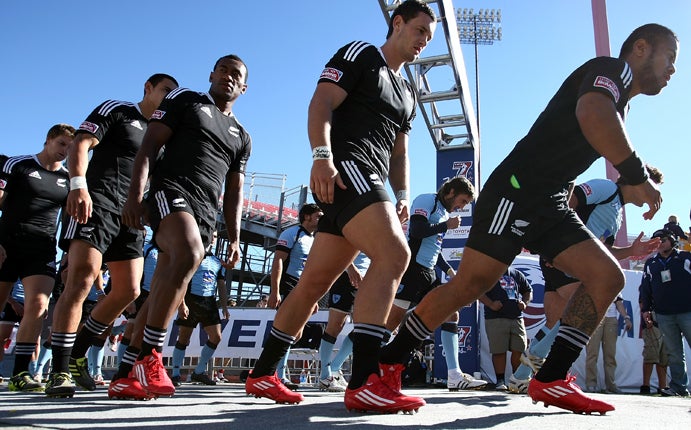Peter Bills: Big task facing teams that confront the All Blacks
Talking Rugby...

Your support helps us to tell the story
From reproductive rights to climate change to Big Tech, The Independent is on the ground when the story is developing. Whether it's investigating the financials of Elon Musk's pro-Trump PAC or producing our latest documentary, 'The A Word', which shines a light on the American women fighting for reproductive rights, we know how important it is to parse out the facts from the messaging.
At such a critical moment in US history, we need reporters on the ground. Your donation allows us to keep sending journalists to speak to both sides of the story.
The Independent is trusted by Americans across the entire political spectrum. And unlike many other quality news outlets, we choose not to lock Americans out of our reporting and analysis with paywalls. We believe quality journalism should be available to everyone, paid for by those who can afford it.
Your support makes all the difference.It didn’t work long enough to be crucial in terms of the outcome of the game. After all, you can’t really suggest a whole lot went right when you have lost 36-8.
Nevertheless, I suspect we glimpsed the tactic many sides will try to employ to muzzle New Zealand in the World Cup, in last weekend’s Super 15 game between the Crusaders and the Sharks.
The fact that the Sharks still led, albeit only by 5 points to 3, until just nine minutes before half time will, I’m quite sure, be studied closely by future opponents of the All Blacks in this year’s Rugby World Cup which begins in just over eight weeks’ time.
What they will see from that opening half hour was a multi-talented Crusaders team making copious mistakes because they were unfamiliar with the unrelenting pressure to which they were subjected, in part by the rush defence. Wild passes were hurled into no man’s land or into touch and the passing accuracy was awful at times.
Even world class players like Daniel Carter and Sonny Bill Williams were guilty of elementary errors caused, it was quite clear, by the pressure the Sharks put them under.
Of course, it was a very different game in the second half as the Sharks ran out of steam and the Crusaders asserted crucial superiority in key phases like the set scrum. The Sharks were too indisciplined, conceding nine turnovers in the opening 22 minutes alone. They were also desperately poor when it came to the kick chase and as fatigue levels mounted after half time, the Crusaders were able to take the ball wide, find an increasing number of gaps and exploit them.
But it was what happened in that opening half hour that will most interest the coaches of teams who know they must get past the All Blacks to have any chance of winning the tournament. Those coaches will reason that their scrum won’t capitulate to a New Zealand scrummage, they won’t turn the ball over at the breakdowns anywhere near as often and they won’t be guilty of aimlessly kicking the ball away, offering the dangerous opposition runners space and time with which to counter attack.
But they will be encouraged by the way some top All Blacks initially struggled to live with the aggressive defensive tactics of the Sharks, forged chiefly upon their rush defence. It was surprising to see world class players put so far off their stride for half an hour or so. Some vital lessons may have been uncovered by the All Blacks detractors in that opening spell.
To beat teams as good as New Zealand at a World Cup you have to hope that at least 85% of your game functions efficiently. You cannot afford a scrum that is on the retreat, for the back row men cannot detach quickly enough in such circumstances.
You can’t afford either a shambles of a line-out, as the Waratahs suffered against the Blues in Auckland in the other quarter final play-off game of last weekend. That will cost you big time.
In Nelson, the Sharks were also superior at the rucks for most of the first half. They went straight through the ruck, got superior numbers there and turned over several balls in this fashion. But they made far too many individual mistakes and couldn’t sustain their challenge after the break.
What the All Blacks will try to do at the World Cup is play a wide game, utilising the midfield creativity and break-making potential of Sonny Bill Williams alongside that beautiful footballer, Conrad Smith. With a back three beyond them that is seriously quick and dangerous on the counter attack and the world’s greatest outside half to set up all this talent, why would the All Blacks selectors ignore all this firepower and try to play solely a forward orientated game?
But if they do, they must expect the kind of lightning fast defence in their faces, making their lives as difficult as possible and subjecting them to real pressure. As we saw last weekend, albeit briefly, even the best players in the world can start to look quite ordinary when put under that kind of intensive defence.
But the question for all New Zealand’s World Cup opponents is an equally tough one. Can they mount and then sustain such a white hot defensive rearguard; can they shackle and shut down some of the game’s quickest, most inventive players and can they do it for 80 minutes, all the while maintaining their own discipline and not giving away soft penalties for Carter to kick and win the game?
That, in a nutshell, is the size of the task facing all the teams that will confront the All Blacks in their own back yard this September/October.
Join our commenting forum
Join thought-provoking conversations, follow other Independent readers and see their replies
Comments